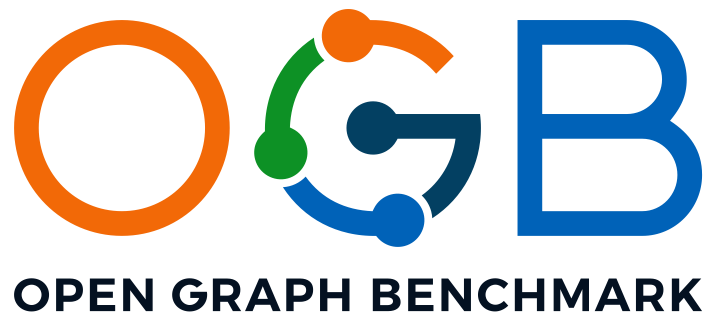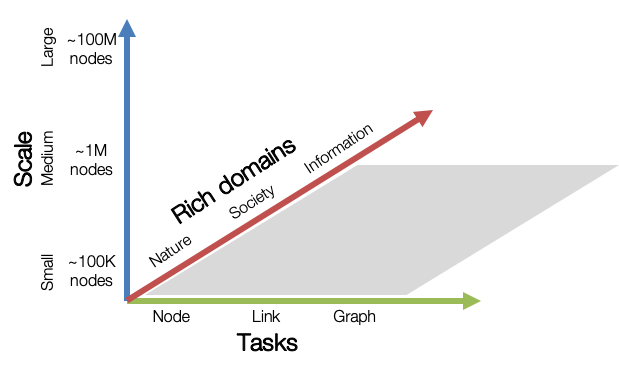
Security News
Research
Data Theft Repackaged: A Case Study in Malicious Wrapper Packages on npm
The Socket Research Team breaks down a malicious wrapper package that uses obfuscation to harvest credentials and exfiltrate sensitive data.

The Open Graph Benchmark (OGB) is a collection of benchmark datasets, data loaders, and evaluators for graph machine learning. Datasets cover a variety of graph machine learning tasks and real-world applications. The OGB data loaders are fully compatible with popular graph deep learning frameworks, including PyTorch Geometric and Deep Graph Library (DGL). They provide automatic dataset downloading, standardized dataset splits, and unified performance evaluation.

OGB aims to provide graph datasets that cover important graph machine learning tasks, diverse dataset scale, and rich domains.
Graph ML Tasks: We cover three fundamental graph machine learning tasks: prediction at the level of nodes, links, and graphs.
Diverse scale: Small-scale graph datasets can be processed within a single GPU, while medium- and large-scale graphs might require multiple GPUs or clever sampling/partition techniques.
Rich domains: Graph datasets come from diverse domains ranging from scientific ones to social/information networks, and also include heterogeneous knowledge graphs.

OGB is an on-going effort, and we are planning to increase our coverage in the future.
You can install OGB using Python's package manager pip.
If you have previously installed ogb, please make sure you update the version to 1.3.6.
The release note is available here.
The recommended way to install OGB is using Python's package manager pip:
pip install ogb
python -c "import ogb; print(ogb.__version__)"
# This should print "1.3.6". Otherwise, please update the version by
pip install -U ogb
You can also install OGB from source. This is recommended if you want to contribute to OGB.
git clone https://github.com/snap-stanford/ogb
cd ogb
pip install -e .
We highlight two key features of OGB, namely, (1) easy-to-use data loaders, and (2) standardized evaluators.
We prepare easy-to-use PyTorch Geometric and DGL data loaders. We handle dataset downloading as well as standardized dataset splitting. Below, on PyTorch Geometric, we see that a few lines of code is sufficient to prepare and split the dataset! Needless to say, you can enjoy the same convenience for DGL!
from ogb.graphproppred import PygGraphPropPredDataset
from torch_geometric.loader import DataLoader
# Download and process data at './dataset/ogbg_molhiv/'
dataset = PygGraphPropPredDataset(name = 'ogbg-molhiv')
split_idx = dataset.get_idx_split()
train_loader = DataLoader(dataset[split_idx['train']], batch_size=32, shuffle=True)
valid_loader = DataLoader(dataset[split_idx['valid']], batch_size=32, shuffle=False)
test_loader = DataLoader(dataset[split_idx['test']], batch_size=32, shuffle=False)
We also prepare standardized evaluators for easy evaluation and comparison of different methods. The evaluator takes input_dict (a dictionary whose format is specified in evaluator.expected_input_format) as input, and returns a dictionary storing the performance metric appropriate for the given dataset.
The standardized evaluation protocol allows researchers to reliably compare their methods.
from ogb.graphproppred import Evaluator
evaluator = Evaluator(name = 'ogbg-molhiv')
# You can learn the input and output format specification of the evaluator as follows.
# print(evaluator.expected_input_format)
# print(evaluator.expected_output_format)
input_dict = {'y_true': y_true, 'y_pred': y_pred}
result_dict = evaluator.eval(input_dict) # E.g., {'rocauc': 0.7321}
If you use OGB or OGB-LSC datasets in your work, please cite our papers (Bibtex below).
@article{hu2020ogb,
title={Open Graph Benchmark: Datasets for Machine Learning on Graphs},
author={Hu, Weihua and Fey, Matthias and Zitnik, Marinka and Dong, Yuxiao and Ren, Hongyu and Liu, Bowen and Catasta, Michele and Leskovec, Jure},
journal={arXiv preprint arXiv:2005.00687},
year={2020}
}
@article{hu2021ogblsc,
title={OGB-LSC: A Large-Scale Challenge for Machine Learning on Graphs},
author={Hu, Weihua and Fey, Matthias and Ren, Hongyu and Nakata, Maho and Dong, Yuxiao and Leskovec, Jure},
journal={arXiv preprint arXiv:2103.09430},
year={2021}
}
FAQs
Open Graph Benchmark
We found that ogb demonstrated a healthy version release cadence and project activity because the last version was released less than a year ago. It has 1 open source maintainer collaborating on the project.
Did you know?

Socket for GitHub automatically highlights issues in each pull request and monitors the health of all your open source dependencies. Discover the contents of your packages and block harmful activity before you install or update your dependencies.

Security News
Research
The Socket Research Team breaks down a malicious wrapper package that uses obfuscation to harvest credentials and exfiltrate sensitive data.

Research
Security News
Attackers used a malicious npm package typosquatting a popular ESLint plugin to steal sensitive data, execute commands, and exploit developer systems.

Security News
The Ultralytics' PyPI Package was compromised four times in one weekend through GitHub Actions cache poisoning and failure to rotate previously compromised API tokens.